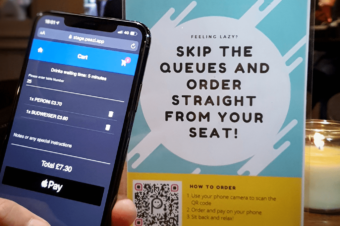
Theft, also known as Shrinkage, affects every retail business and as highlighted in the TV show ‘Saving Poundstretcher’, broadcast on Channel 4 recently.
In the series, Chris Edwards (Retail Guru and previous owner of Poundland) takes a closer look at how Poundstretcher is operating on the inside and is shocked by what he discovers. In 2017, Poundstretcher was subjected to a huge £7 million loss due to theft, with less than half of theft committed by shoplifters and the majority of the theft carried out was from within the business.
Overall, the show identified 3 main areas of theft in a handful of stores. These were:
• Stealing Stock & Cash
• Under-ringing tills
• Overstating their hours or ‘Ghost working’
Stealing Stock & Cash
Staff have become more sophisticated and rather than steal physical items and run the risk of the item being found within their possession they steal the cash equivalents. The show highlighted that at a store in Castleford, a member of staff had been caught on CCTV refunding receipts to herself for purchases she never made on a £50 rug she had never purchased. Staff at the store are not searched after their shift, and with limited staff on shifts at certain times within the day she seized her opportunity to pocket cash whilst working alone. Poundstretcher did not have the correct procedures in place to check the refunded items which, ideally, you would ask for another staff or managers authorisation
Without these procedures in place, it is very easy for staff to abuse the business.
Under-ringing tills
A common area used by staff was highlighted in the series with one member of staff was found to have been under-ringing her till regularly to friends and family.
She was caught on CCTV serving her own grandmother for a shop of around 30 items, 6 of which were scanned and paid for. The store had suspected this for a long time but again without checks and procedures in place, she had been able to steal from the business.
Overstating Hours
‘Ghost working’ is a phrase in the industry that means staff are billing for hours they haven’t worked.
In the show a store manager was suspected of not working the hours they said they had claimed to work each week. The store manager had claimed she was working regular hours up until 10.30pm before closing up. However, when viewing the CCTV footage from the night in question, the store lights were turned off at 8.36pm. The manager had actually left the store at 7.06pm and returned to manually clock out, ensuring she was paid an extra 3 hours.
The TV show is a sad reminder that not all the people that work within your business are trustworthy and without proper procedures and the ability to trace accountability within the procedures allows the temptation to attract staff to steal.

As part of the 2018 ACS Crime Report, local retail store owners were asked: “what are the most common ways in which employees attempt to steal from your business?”
The survey found that the 2 most common internal thefts were cash stolen directly from tills and the
consumption of products in store. It is also estimated that last year there were 18,591 incidents of theft carried about by staff in the retail sector.
But it’s not all internal theft which causes issues. As anybody in the retail industry knows, shoplifting has always been and unfortunately is most likely to remain the most common and the costliest form of shrinkage. The Home Office estimates that 67% of crime in retail and wholesale is due to external theft. The direct cost of customer theft since 2016 has grown by almost 15% according to the British Retail Consortium’s Annual Crime Survey 2017.
With over 30 years’ experience in the industry, GS Systems have come across a vast range of similar situations. With this in mind, we have addressed some problems we have come across in the past and solutions or recommendations that we have found to be extremely effective.

In relation to the article, how many of your customers would you say are or have been affected by similar problems?
Staff theft doesn’t tend to be something that people talk about. A lot of people may not actually know that they have been affected by it, however, more often than not, they just don’t like to admit to it. Most people that run a retail or hospitality business where employees handle stock and cash, will have at some time or other, found that a member of staff has been dishonest.
Can you detail a specific incident/instance from one of your clients’ problem/issues which shocked you?
Many businesses tend to have the issue of a manager stealing a lump sum of around £10,000 or £20,000 from the safe or a similar blatant act. There’s a very strong possibility, however, that before this incident, that individual was taking around £100 a day here and there in less noticeable amounts and only when they became quite desperate did they then take a huge amount before disappearing. This is a common occurrence.
Theft by general managers is not unusual.
In one case study, the manager of an anonymous pub company stole £20,000 from the company safe over several weeks. This incident could have been prevented if the correct procedures were in place.
It is highly recommended that you set the amount of the float which will be held at the site. This should be a reasonable amount of money needed to float the business (depending on the size, anywhere from £1,500 to £3,000). Everything but the float should be banked weekly.
Procedures are a huge part of what we at GS Systems do to help you monitor and prevent incidents like these from happening. We help you implement your cash handling, cash management and operational procedures around your EPOS system. It is far too easy for people to take money unnoticed, however, following strong procedures integrated through your EPOS system will remove the temptation and help to keep staff honest.
One anonymous pub owner had suspected one of his managers was stealing from him. The owner implemented a new EPOS system and found that the manager was resisting the system. He would make the system fail or blame the system for errors. Thankfully, in this scenario, CCTV had been installed and it was seen that he was not only sabotaging the system, but he was also stealing money. When confronted with the evidence and threatened with the police, it was revealed he had stolen £28,000 over a long period of time.
What solutions/support did GS have to offer them in relation to this problem?
EPOS solutions provide an alternative to relying on manual paperwork. GS Systems work with your business to help embed processes and procedures into your day to day running. Along with CCTV, we are able to tie in other sensors and monitors to help identify any suspicions or fraud.
It doesn’t matter if you run a retail business selling stock or a service industry business providing services, it’s all too common to be affected by issues like these. For a business providing services, certain areas would be more difficult to gauge and monitor. For example, a shoe repair shop may want to implement a ticketing process, by which, for every time a customer brings in a pair of shoes to be repaired, the transaction is put directly through the EPOS system and a ticket issued to the customer. Only then is the shoe repairer allowed to work on the shoes. If an auditor were to walk into the shop, they would then be able to check transactions against repairs with receipts. It would also be easy to see if there were shoes which were being repaired which aren’t in the system, meaning someone is being dishonest and not following procedures.

A crazy golf business may install a sensor on the last hole to record the game and check against how many people have played golf through the EPOS system to ensure staff aren’t giving away free rounds of golf or even pocketing the money from the till.
No matter what sort of business you run, there will always be dishonest people who will try and work out how to scam it and at GS Systems our job is to provide systems and solutions to prevent this from happening.
In some cases, there are high margin items which can be difficult to track. Whatever it is, we will help to implement procedures alongside an EPOS system to help monitor these items. For example, an ice cream man may struggle to keep track of ice cream cones. We would tie in procedures to help track how many cones have been used or wasted etc. If you have a good strong set of procedures built around your EPOS system, this will help you keep track of those difficult high margin items.
How quickly was the customer able to see results from the support/solutions GS systems offered?
In one scenario, a large and busy restaurant chain were having multiple failures and things going wrong constantly due to poor systems. GS Systems implemented our systems and procedures and within 4 weeks the system had already paid for itself! In another case, we implemented our systems into multiple branches of a restaurant chain and trained their staff on both the systems and procedures and through this the weekly revenue increased by £13,000!
Every business owner wants to trust their staff and doesn’t want to believe that they would be dishonest. However, having a good system and procedures in place helps to remove the temptation and keep people honest.
Drawing on your experience in the industry and with customers/potential customers or even businesses you’ve heard of – what are the best tips and procedures to ensure problems like these can be managed before they spiral out of control?
A lot of the time, it takes a third party, such as the Inland Revenue or an accountant to recognise a problem through the GP’s being so low that it looks as though the business owner is under-declaring their sales. In one family-owned business, this was the case and it turned out that family members were actually stealing cash, cigarettes and various other items to sell privately.
The best tips are to remove the temptation and the risks wherever possible. Ensure staff identify themselves when running sales through the system and ensure only certain people are assigned to carry out refunds. This will help keep staff member honest and only become an issue if staff are in collusion with each other.
Ensure that CCTV is integrated as a back up to help minimise theft and instances of ghosting, wherein a staff member will account for hours they have not worked.
A good EPOS system is only as good as the procedures built in and around it. To find out how GS Systems can help you and your business, get in touch today to speak to a specialist and request a FREE needs analysis!
*https://www.statista.com/statistics/303563/shoplifting-in-england-and-wales-uk-y-on-y/







